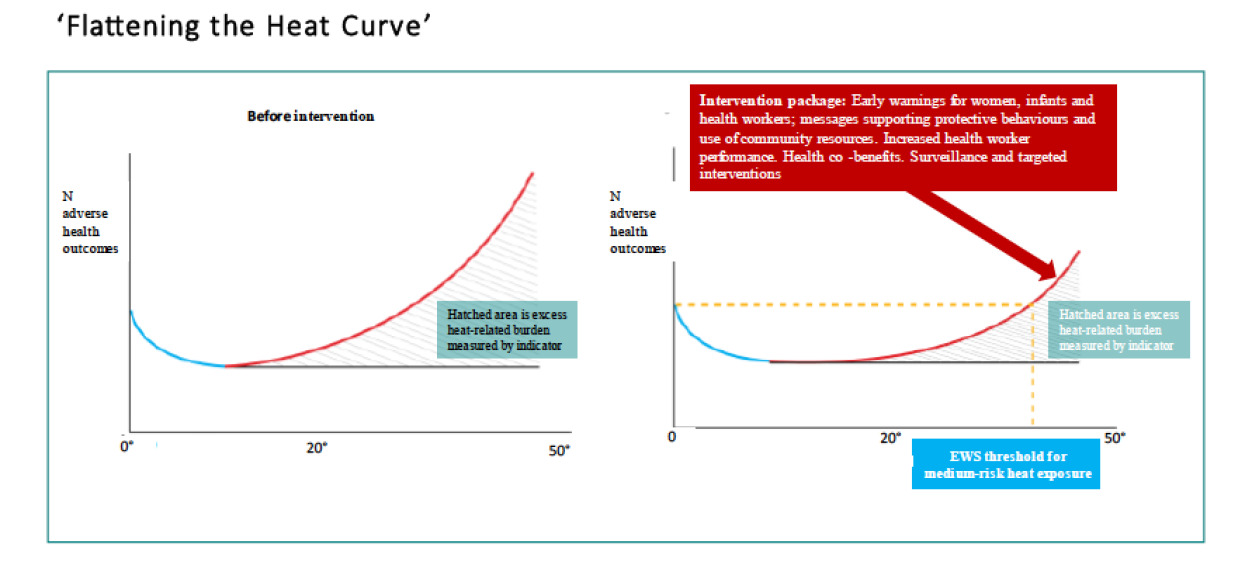HIGH Horizons Heat Indicators for Global Health

Project summary
The HIGH Horizons project addresses a number of key knowledge gaps around the quantification and monitoring of direct and indirect impacts of heat exposure on maternal, newborn and child health (MNCH). In the project, pregnant women, infants and health workers serve as sentinel populations for tracking climate change impacts, adaptations and co-benefits. These are key populations and protecting them is critical for creating a living and working life that is health promoting, and for ensuring a healthy future for the next generation. The project will run over four years and includes ten partners across nine countries and encompasses activities in both the EU and sub-Saharan Africa.
We quantify and monitor direct and indirect health impacts of extreme heat; test a personalised Early Warning System (EWS); and implement integrated adaptation-mitigation actions in health facilities. Analyses of heat impacts and data science predictive modelling using data from Sweden; Lazio Italy, and health facilities in Kenya and South Africa underpin all activities. These analyses and systematic reviews inform testing and selection of global, EU and national indicators. Analyses also inform cut-off thresholds for EWSs, stratified by risk groups. A smartphone app (ClimApp-MCH) will deliver warnings and setting-specific messages, co-designed locally. The app will be evaluated among 200 mothers and infants in Sweden, South Africa and Zimbabwe, from antepartum through 12 months of infant age. Simultaneously, we will document impacts of heat exposure on health worker wellbeing, health, productivity and quality of care, including through time-motion studies. Modifications to health facilities will be co-designed and modelled to reduce heat exposure for health workers and to limit facilities carbon emissions. Health worker outcomes and facility emissions will be compared pre- and post-intervention. Analyses weighing costs and benefits cut across all activities.
Throughout we will engage relevant stakeholders in both conduct of the research and dissemination of project findings, prioritising country partners, EU and global policy makers and leveraging existing networks. The final set of indicators on climate change and maternal, newborn and child health will be released in a WHO, UNICEF and UNFPA guidance document.
Objectives
The HIGH Horizons project has four specific objectives:
- Identify and select suitable indicators for quantifying and monitoring the global, EU and national-level health impacts of extreme heat among pregnant and postpartum women, newborns and infants in Europe and sub-Saharan Africa;
- Develop and test an Early Warning System using a smartphone app to provide individualized heat stress warnings, and locally adapted messaging for protecting pregnant and postpartum women, infants and health workers;
- Identify cost-effective, integrated adaptation-mitigation interventions to alleviate heat impacts on health workers, and to reduce carbon emissions associated with health care;
- Support global and EU climate policies and activities on the monitoring of direct and indirect impacts of climate change on health, and the strengthening of Early Warning Systems through guidance documents, and risk assessment and cost-benefit analysis tools.
Consortium overview
Coordinator: Universiteit Gent, Belgium
Beneficiaries: Wits Health Consortium (Pty) Ltd, South Africa
Centre For Sexual Health and HIV and AIDS Research, Zimbabwe
Aga Khan Health Service Kenya Lbg, Kenya
Lunds Universitet, Sweden
Karolinska Institutet, Sweden
World Health Organization, Switzerland
Danmarks Tekniske Universitet, Denmark
Graz Universitaet, Austria
Associated Partner: London School of Hygiene and Tropical Medicine Royal Charter, United Kingdom (funded by UK)
Website link: HIGH* Horizons - Project Website - Funded by the EU und UKRI (high-horizons.eu)
Funding agencies
EU funding UKRI funding
Team
Stanley Luchters, Birgit Kerstens
Coordinator
Coordinator: Universiteit Gent, Belgium
Partners
Consortium overview Coordinator: Universiteit Gent, Belgium Beneficiaries: Wits Health Consortium (Pty) Ltd, South Africa Centre For Sexual Health and HIV and AIDS Research, Zimbabwe Aga Khan Health Service Kenya Lbg, Kenya Lunds Universitet, Sweden Karolinska Institutet, Sweden World Health Organization, Switzerland Danmarks Tekniske Universitet, Denmark Graz Universitaet, Austria Associated Partner: London School of Hygiene and Tropical Medicine Royal Charter, United Kingdom (funded by UK)
Period
September 01, 2022 - August 31, 2026
Project status
Project ongoing

